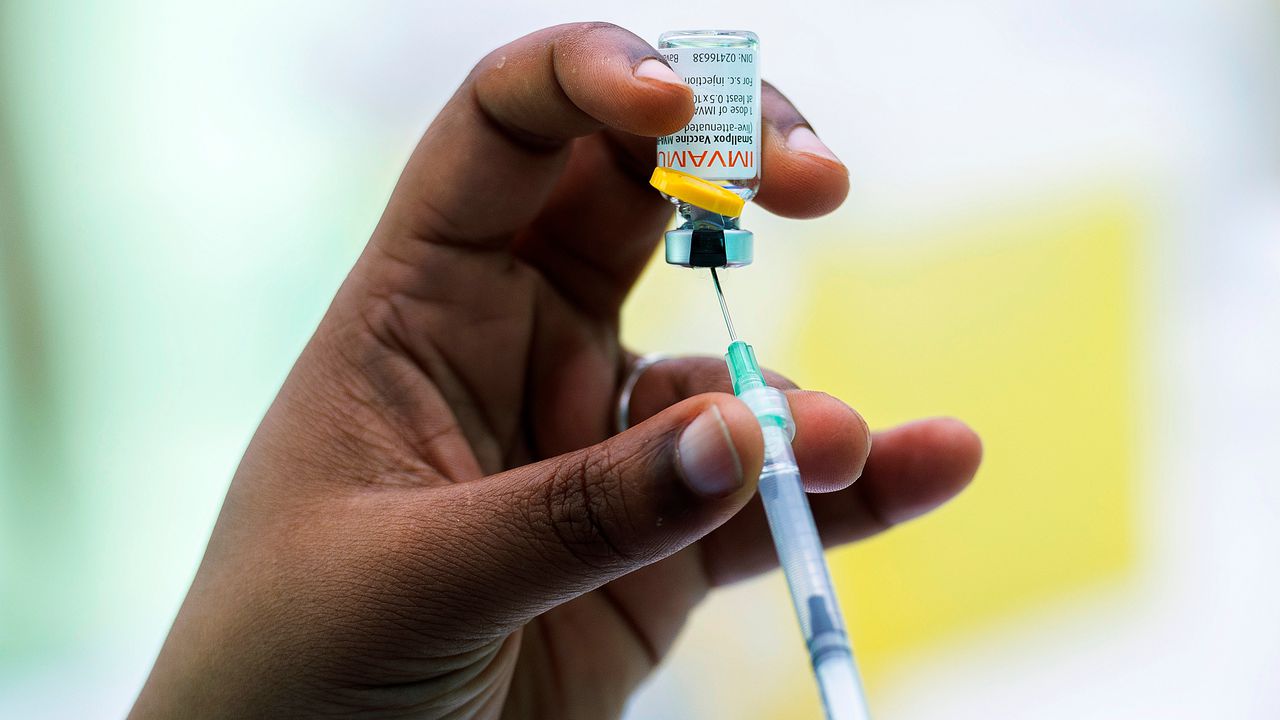- August 25, 2022
- No Comment
- 7 minutes read
First suspected human-to-dog monkeypox transmission reported in Europe – MLive.com

A health care worker prepares a monkeypox vaccine in Montreal, Saturday, July 23, 2022. Nearly 800,000 doses of the monkeypox vaccine will soon be available for U.S. distribution, U.S. health regulators said Wednesday, July 27, 2022.Graham Hughes | The Canadian Press via AP
A 4-year-old Italian Grayhound dog has tested positive for monkeypox after the two men he lives with were diagnosed with the virus.
Earlier this month, the medical journal The Lancet published a report from Paris, France which could indicate the potential for transmission between humans and domestic pets.
While there haven’t been any known U.S. cases of human-to-pet transmission to date, the U.S. Centers for Disease Control and Prevention (CDC) has said it’s possible for spread through close contact including petting, cuddling, hugging, kissing, licking, sharing sleeping areas, and sharing food.
Monkeypox is a viral infection with symptoms typically including a rash that looks like pimples or blisters, as well as fever, headache, muscle aches, swollen lymph nodes, chills, and exhaustion. Symptoms typically appear 1-2 weeks after exposure, and the rash typically lasts 2-4 weeks — during which the person is infectious — according to the state health department.
In the France case, the two men developed rashes, leading to positive PCR tests for monkeypox. Twelve days after their onset of symptoms, their dog presented with lesions on its abdomen and anus. The dog had no previous medical disorders.
The men reported co-sleeping with their dog, according to the report. Samples from the dog and men were compared. Both contained the same strain of virus, and showed 100% sequence homology.
Researchers said the case suggests human-to-dog transmission occurred, and should prompt debate on the need to isolate pets from individuals who have been infected with the virus. More research is needed to understand potential for secondary transmission via pets.
Related: Should we be concerned about parallel monkeypox and COVID surges?
Cases of monkeypox have been reported in rodents and primates in countries where the virus is endemic, and in prairie dogs in the U.S. and in captive primates in Europe that were in contact with imported animals.
Monkeypox is not common in the U.S., making the recent outbreak unusual. Already this year there have been at least 12,689 reported cases across the country, including 2,620 in New York, 1,945 in California, 1,268 in Florida, 1,048 in Texas and 1,013 in Georgia.
Michigan had 104 known cases of monkeypox as of Tuesday, Aug. 16, ranking 19th nationally. The cases are spread across 14 counties, led by Wayne with 42, Oakland with 18, Macomb with 13, Kent with nine, Washtenaw with six, Ingham with five and Ottawa with four. Other counties with at least one case include Bay, Ionia, Jackson, Livingston, Montcalm, Muskegon, and St. Clair.
No deaths have been reported in the U.S. thus far. Michigan hospitals have reported few, if any, cases in hospitalized patients. Most patients are tested and then sent home to isolate.
If you are infected with monkeypox, do not have close contact with pets after symptom onset, according to the CDC. Ask a friend or family member to care for the pet if they haven’t been exposed. If your pet has been exposed, keep them away from other animals or people for 21 days after the most recent contact.
Health officials do not recommend surrendering, euthanizing or abandoning pets just because of a potential exposure or positive case of monkeypox. Do not wipe or bathe your pet with chemical disinfectants, alcohol, hydrogen peroxide, or other products, such as hand sanitizer, counter-cleaning wipes, or other industrial or surface cleaners.
Potential signs of monkeypox in animals could include lethargy, lack of appetite, coughing, nasal secretions or crust, bloating, fever, and/or pimple or blister-like skin rash. Call your vet if you notice your animal appears sick within 21 days of having contact with a person who has confirmed or suspected monkeypox.
Last week, federal regulators updated their guidance for using the monkeypox vaccine, Jynneos, between layers of the skin as two doses 28 days apart. Previously it was recommended to administer the shot under the skin. The change increased the number of doses up to five-fold, according to the FDA.
“MPV continues to spread and we are hopeful that the increase in vaccination doses will help us prevent further spread and offer protection for those who may have been or may be exposed,” said Dr. Natasha Bagdasarian, Michigan’s chief medical executive. “We encourage those at risk to contact their local health department and get vaccinated as soon as possible.”
For the latest updates on the 2022 outbreak, visit the CDC website or Michigan’s monkeypox web page.
Read more on MLive:
Medicare is changing. How will it affect Michiganders?
Michigan’s COVID cases rise again as daily average hits 11-week high
Michigan hospital speeds up monkeypox testing
Note to readers: if you purchase something through one of our affiliate links we may earn a commission.
Registration on or use of this site constitutes acceptance of our User Agreement, Privacy Policy and Cookie Statement, and Your California Privacy Rights (User Agreement updated 1/1/21. Privacy Policy and Cookie Statement updated 7/1/2022).
Cookie Settings
© 2022 Advance Local Media LLC. All rights reserved (About Us).
The material on this site may not be reproduced, distributed, transmitted, cached or otherwise used, except with the prior written permission of Advance Local.
Community Rules apply to all content you upload or otherwise submit to this site.![]() Ad Choices
Ad Choices

